Vegetables and eggs are the most in short supply in HCM City due to the supply disruption caused by COVID-19, and the city needs support from provinces in the eastern and Central Highlands regions to mitigate this.

Vegetables and eggs are in short supply in HCM City due to disruptions in supply chains caused by COVID-19. The city needs support from provinces in the eastern and Central Highlands regions to mitigate this, the city's Department of Industry and Trade (DoIT) has advised.
Nguyen Nguyen Phuong, the department’s deputy director, said the rising number of COVID cases has caused many localities in the Cuu Long (Mekong) Delta to adopt social distancing measures. As a result, people there are buying and stocking up on groceries and eggs, making it difficult for HCM City suppliers to buy goods.
A number of places in the delta have ordered social distancing under Directive 16. When the entire region applies it, Phuong warned, it will be even more difficult to source and transport goods from the region.
In recent days people have been buying large quantities of chicken eggs at supermarkets and reselling them elsewhere at higher prices, he said.
Some supermarkets in the city have set limits of two trays of eggs per person.
The DoIT wants the city government to provide businesses with funds to stockpile goods in order to stabilise supply and subsequently prices.
Before Directive 16 the city consumed about 7,000 tonnes of vegetables, fruits, and meat, but supply decreased by half after the city’s three wholesale markets closed.
The department has instructed supermarkets to increase their supply, but there is still a shortage of around 1,000 tonnes.
It has set up mobile selling points to bridge the gap and reopened some markets to sell vegetables, including Phu Tho Market which reopened on Friday with six traders.
"The department continues to work with districts to assess the situation, and will allow traditional markets that meet safety norms to reopen," Phuong said.
They would not open entirely, but a few small traders would sell essential items, he went on.
The number of people entering those markets at a time would also be controlled, he said.
Flipside: Farmers cannot sell vegetables
While there is a shortage of vegetables in HCM City, farmers in many provinces with social distancing are unable to sell their vegetables.
Lam Dong Province has an abundance of fruits and vegetables but no traders to buy them.
Thach of Lac Lam Commune in the province’s Don Duong District said: “Unfortunately, my family had to destroy 4,000 square metres of coriander because we were unable to sell it.”
In Ba Ria - Vung Tau, many vegetable farm owners face similar difficulties.
In the province’s Tan Hai Commune 24 families grow vegetables on 110 hectares and supply 500-600 tonnes a year to mainly Dong Nai and HCM City.
Ngo Quoc Tu, an official in charge of agriculture in the commune, said: “Traders cannot come to pick up goods due to localities applying social distancing and the closure of markets. Vegetable growers have been badly affected."
The situation is similar in Dong Thap Province where vegetable prices in the concentrated vegetable farming area of Long Thuan Commune, Hong Ngu District, have fallen sharply.
Pham Van Khiem, who grows nearly 3,000 square metres of herbs, said prices have never fallen as much as they have in recent days.
Nguyen Van Be, who grows celery and coriander on 2,000 square metres in Long Thuan Commune, said traders blame social distancing and the difficulty in transportation to knock down prices.
Mai Van Khan, director of the Tan Tien General Agricultural Service Cooperative in Da Lat, said usually the harvest is transported to the general warehouse in Duc Trong District to preserve and distribute to supermarkets and traders in HCM City’s wholesale markets.
But since the markets closed, he has had to find buyers in the central and northern regions, he said.
The situation is expected to improve in the coming days.
A representative of AEON Vietnam said more than 20 varieties of vegetables and fruits were stocked in its warehouses and outlets on Saturday and will be offered to customers at heavily discounted prices.
HCM City's Department of Industry and Trade has also requested e-commerce platforms such as Lazada, Tiki, Sendo, and Shopee increase their output and delivery capacity for agricultural products, encouraging people to access this shopping channel. — VNS





